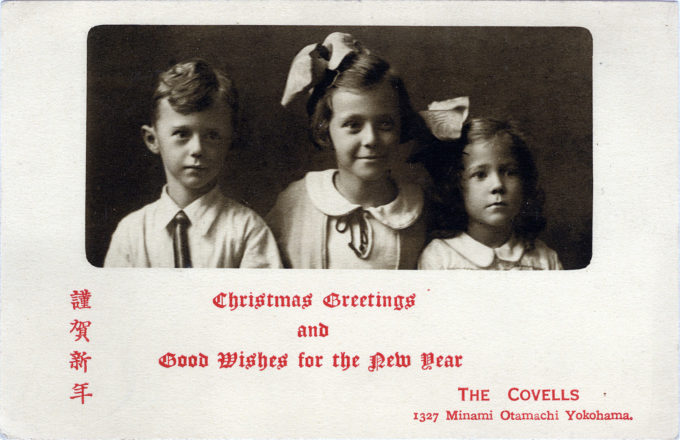
“Christmas Greetings from the Covells”, c. 1930. Peggy (Margaret) Covell – see her story below – is at center.
See also:
Attack on Pearl Harbor propaganda postcard, c. 1942.
“James Howard Covell was born in 1896 in Athens, Pennsylvania, the youngest son of Rev. Milton Covell, a Baptist minister. James received his Masters Degree from Union Theological Seminary. He volunteered for missionary service and was sent to Japan where he served as an instructor at the Mabie Memorial School for Boys from 1920 to 1938. In 1922, he met Charma Marie Moore, also a missionary, who was teaching in Osaka, and they married in 1922. They survived the terrible earthquake in Yokohama in 1923, when their home was destroyed by fire, and would have three children – Alice, David, and Margaret.
“In 1936 the family returned to LeRoy [Pennsylvania] where Mr. and Mrs. Covell addressed the Baptist Church congregation and made a plea for understanding of the Japanese people. Mr. Covell said that the people of Japan should not be measured by the acts of the imperial government. The Covells returned to Japan, teaching at Kanto Gakuin University, Yokohama, and remained there until 1939 when the American Baptist Mission Board reassigned the Covells to the Philippines. In 1940, because of the worsening political situation in the Pacific between the US and Japan, the Covells sent their three children back to the US, planning to reunite in 1942 during a furlough. Unfortunately, those plans were disrupted by the onset of war in December 1941, and the subsequent Japanese invasion of the Philippines.
“… [I]n March 1944, the War Department notified Howard’s brother in Oneida that Howard and his wife had been captured [in the Philippines] by the Japanese on December 19, 1943 and it was believed that they were dead.
“… [Toward the end of the war, a Japanese POW] was nursed back to health by a young woman and this was the story he told: ‘After the war ended, an 18 year-old American girl came to the camp as a volunteer social worker. She helped the Japanese POWs with great energy and kindness. Her name was Margaret Covell, but the men called her Peggy. She would do anything to help them. Three weeks after she arrived, a prisoner asked her, ‘Why are you so kind to us?’ Her answer was, ‘Because Japanese soldiers killed my parents.’ The prisoners were astonished as she told the story of how her Christian missionary parents were killed by the Japanese army in the interior of the Philippines. The Covells were wrongly accused of being US spies; both were tried, convicted, and then beheaded.
“Peggy found out about this tragedy at the end of the war. She was full of hatred for the Japanese at first. But, as she thought more and more of their final moments, she came to realize that her parents must have been praying for the forgiveness and salvation of these Japanese soldiers. So, she decided to follow her parents’ example by forgiving and helping Japanese POWs.
– “The Story of Forgiveness”, by Lynne Belluscio, LeRoy (PA) Pennysaver, June 12, 2011
Addendum (from Wikipedia):
“After the war, Captain Mitsuo Fuchida, who led the air attack on Pearl Harbor, was called on to testify at the trials of some of the Japanese military for Japanese war crimes, infuriated because he believed the trials were little more than ‘victors’ justice’. In the spring of 1947, convinced that the U.S. had treated the Japanese the same way and determined to bring that evidence to the next trial, Fuchida went to Uraga Harbor near Yokosuka to meet a group of returning Japanese prisoners of war.
“Fuchida was surprised to find his former flight engineer, Kazuo Kanegasaki, whom all had believed had died in the Battle of Midway. When questioned, Kanegasaki told Fuchida that they were not tortured or abused, much to Fuchida’s surprise, and then went on to tell him of a young lady, Peggy Covell, who served them with the deepest love and respect, but whose parents, missionaries, had been beheaded by Japanese soldiers on the island of Panay in the Philippines.
“For Fuchida, this was inexplicable, as in the Bushido code revenge was not only permitted, it was ‘a responsibility’ for an offended party to carry out revenge to restore honor. The murderer of one’s parents would be a sworn enemy for life. He became almost obsessed trying to understand why anyone would treat their enemies with love and forgiveness.
“Captain Fuchida’s life was changed by Peggy Covell’s story and he converted to Christianity and devoted his life to the teachings of forgiveness and peace.”

